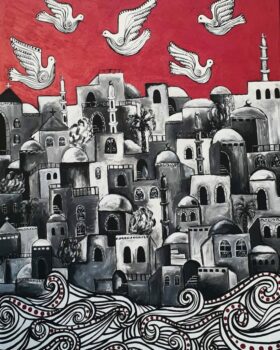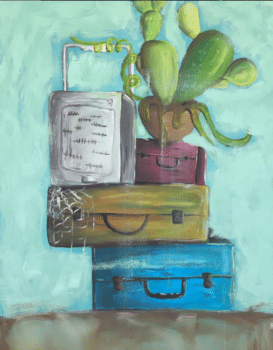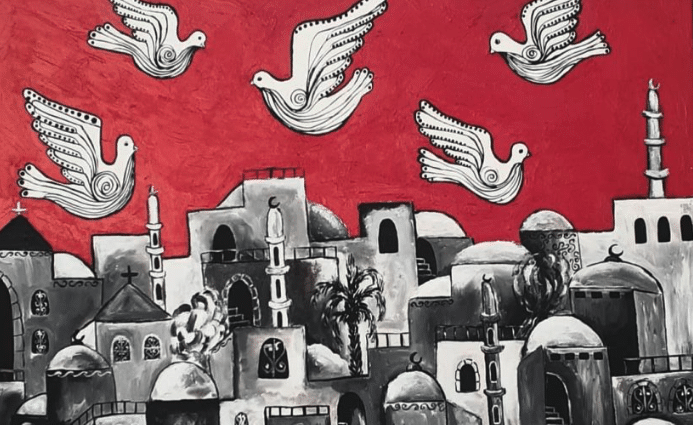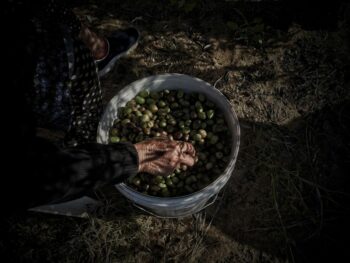Dear friends,

Heba Zagout (1984—2023), Gaza Peace, 2021.
Greetings from the desk of Tricontinental: Institute for Social Research.
On 4 March, Commissioner-General of the United Nations Relief and Works Agency for Palestine (UNRWA) Philippe Lazzarini presented his startling report on the situation in Gaza (Palestine) to the UN General Assembly. In just 150 days, Lazzarini said, Israeli forces have killed more than 30,000 Palestinians, nearly half of them children. Those who survive continue to face Israel’s attacks and are afflicted with the traumas of war. The four horsemen of the apocalypse described in the Bible’s Book of Revelation—Conquest, War, Famine, and Death—are now galloping from one end of Gaza to the other.
‘Hunger is everywhere’, Lazzarini said. ‘A man-made famine is looming’. A few days after Lazzarini made his blunt assessment, Gaza’s Ministry of Health reported that child malnutrition levels in the northern part of the strip are ‘particularly extreme’. The UN’s Humanitarian Coordinator for Palestine Jamie McGoldrick said that ‘hunger has reached catastrophic levels’ and ‘children are dying from hunger’. By the end of the first week of March, at least twenty children had died due to starvation. Among them was ten-year-old Yazan al-Kafarna of Beit Hanoun (northern Gaza), who died in Rafah (southern Gaza) on the same day that Lazzarini spoke at the UN. The image of Yazan’s emaciated body tore into the already battered conscience of our world. Story upon ugly story pile up alongside the rubble produced by Israeli bombing. Dr Mohammed Salha of Al-Awda hospital, where Yazan died, says that many pregnant women suffering from malnutrition have birthed stillborn foetuses or have required caesarean operations to remove them—without anaesthetics.
A ceasefire is nowhere on the horizon. Nor is any real commitment to get aid into Gaza, particularly in the north where hunger has taken the greatest toll (on 28 February, UN World Food Programme Deputy Executive Director Carl Skau told the Security Council that there is a ‘real prospect of famine [in northern Gaza] by May, with over 500,000 people at risk if the threat is allowed to materialise’). Around 155 trucks of aid are entering Gaza per day—well below the 500-truck daily capacity at the crossing—with only a few of them going to northern Gaza. Israeli soldiers have been ruthless. On 29 February, when aid trucks arrived at the Al-Nabulsi roundabout (on the southwestern edge of Gaza City, in northern Gaza) and desperate people rushed to them, Israeli troops opened fire and killed at least 118 unarmed civilians. This is now known as the Flour Massacre. Airdrops of food are not only inadequate in volume, but they have resulted in their own heartbreaks, with some parcels landing in the Mediterranean Sea and others crushing at least five people to death.

Mohammed Sami Qariqa (1999—2023), from the exhibition ‘Gaza International Airport’, 2022.
As if from nowhere, U.S. President Joe Biden announced in his State of the Union address on 7 March that his country would build a ‘temporary pier’ in southern Gaza to facilitate the entry of aid through the sea. The context for this decision, which Biden omitted, is clear: Israel is not permitting the bare minimum of humanitarian aid to pass through land crossings, Israel destroyed the Gaza harbour on 10 October, and Israel pulverised the Gaza airport at Dahaniya in 2006. This decision is certainly not from nowhere. It also comes in the midst of the campaign for democrats in the U.S. to vote ‘uncommitted’ in the ongoing primaries to make it clear that the US’s complicity in the genocide will negatively impact Biden’s re-election effort. Although one loaf of bread is better than none, these loaves of bread will come to Gaza stained in blood.
There is a hollowness to Biden’s pronouncement. Once aid arrives at this ‘temporary pier’, how will it be distributed? The main institutions in Gaza capable of any mass-scale distribution are UNRWA—now defunded by most Western countries—and the Hamas-led Palestinian government—which Western countries have set out to destroy. Since neither will be able to distribute humanitarian aid on the ground (and, as Biden said, ‘no U.S. boots will be on the ground’), what will become of the aid?
UNRWA has been at work since shortly after UN resolution 302 (IV) was passed in 1949, since which time it has been the main organisation to provide relief to Palestinian refugees (of which there were 750,000 when UNRWA began its operations and of which there are 5.9 million today). UNRWA’s mandate is precise: it must ensure the well-being of Palestinians but cannot operate to permanently settle them outside their homes. That is because UN resolution 194 affords Palestinians the ‘right to return’ to their homes from which they were ejected by the Israeli state. Although UNRWA’s main work has been in the field of education (two thirds of its 30,000 staff work for UNRWA schools), it is also the organisation most equipped to handle aid distribution.
The West allowed for the creation of UNRWA not because of any particular concern for Palestinians, but because—as the U.S. Department of State noted in 1949—the ‘conditions of unrest and despair would provide a most fertile hotbed for the implantation of Communism’. That is why the West provided funds for UNRWA (although, since 1966, this has come with severe restrictions). In early 2024, most Western countries cut their funding to UNRWA based on an unsubstantiated accusation tying UNRWA employees to the 7 October attack. Though it has recently come to light that the Israeli army tortured UNRWA employees, such as through waterboarding and beatings, and forced them to make these confessions, most of the countries that cut their funding based on these grounds have failed to reinstate it (with the exception of Canada and Sweden, which have recently resumed their funding). Meanwhile, several Global South countries—led by Brazil—have increased their contributions.

Fathi Ghaben (1947—2024), Ray of Glory, n.d.
Filippo Grandi, the UN High Commissioner for Refugees who ran UNRWA from 2010 to 2014, recently said that if ‘UNRWA is not permitted to work, or is defunded, I can hardly see who can substitute [it]’. No humanitarian relief programme for Palestinians in Gaza is possible in the short run without UNRWA’s full partnership. Anything else is a public relations sham.
Reading about the famine in Gaza, I remembered a poem written by Wisława Szymborska (1923—2012) about the Szebnie concentration camp in Jasło (southern Poland), which held Polish Jews, Romani people, and Soviet prisoners of war from 1941 until the camp was liberated by the Red Army in September 1944. Brutal, horrible violence was inflicted by the Nazis at Szebnie, particularly against the thousands of Jews who were killed there in mass executions. Szymborska’s poem, ‘Starvation Camp Near Jasło’ (1962), does not flinch from the wretchedness surrounding her, nor from the possibility of humanity for which she yearned.
Write it down. Write it. With ordinary ink
on ordinary paper: they weren’t given food,
they all died of hunger. All. How many?
It’s a large meadow. How much grass
per head? Write down: I don’t know.
History rounds off skeletons to zero.
A thousand and one is still only a thousand.
That one seems never to have existed:
a fictitious foetus, an empty cradle,
a primer opened for no one,
air that laughs, cries, and grows,
stairs for a void bounding out to the garden,
no one’s spot in the ranks.Majd Arandas (1994—2023), My Grandmother, 2022.
It became flesh right here, on this meadow.
But the meadow’s silent, like a witness who’s been bought.
Sunny. Green. A forest close at hand,
with wood to chew on, drops beneath the bark to drink —
a view served round the clock,
until you go blind. Above, a bird
whose shadow flicked its nourishing wings
across their lips. Jaws dropped,
teeth clattered.At night a sickle glistened in the sky
and reaped the dark for dreamed-of loaves.
Hands came flying from blackened icons,
each holding an empty chalice.
A man swayed
on a grill of barbed wire.
Some sang, with dirt in their mouths. That lovely song
about war hitting you straight in the heart.
Write how quiet it is.
Yes.
The paintings and photograph in this newsletter were created by Palestinian artists killed in Gaza during Israel’s genocide. They have died, but we must live to tell their stories.
Warmly,
Vijay


